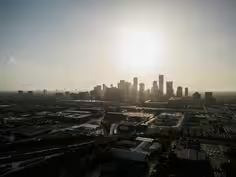
Syrian refugee elected mayor in German town
Clip: 7/27/2023 | 8m 43sVideo has Closed Captions
Syrian refugee elected mayor in German town as anti-immigrant sentiment rises
For eight years, the NewsHour has been running a series called Desperate Journey tracking major events in migration across the world. Much of the time, we're reporting on tragedies but occasionally there’s a glimpse of light. Special correspondent Malcolm Brabant reports from southern Germany where a Syrian refugee just became a city's mayor at a time when anti-immigrant sentiment is on the rise.
Problems playing video? | Closed Captioning Feedback
Problems playing video? | Closed Captioning Feedback
Major corporate funding for the PBS News Hour is provided by BDO, BNSF, Consumer Cellular, American Cruise Lines, and Raymond James. Funding for the PBS NewsHour Weekend is provided by...

Syrian refugee elected mayor in German town
Clip: 7/27/2023 | 8m 43sVideo has Closed Captions
For eight years, the NewsHour has been running a series called Desperate Journey tracking major events in migration across the world. Much of the time, we're reporting on tragedies but occasionally there’s a glimpse of light. Special correspondent Malcolm Brabant reports from southern Germany where a Syrian refugee just became a city's mayor at a time when anti-immigrant sentiment is on the rise.
Problems playing video? | Closed Captioning Feedback
How to Watch PBS News Hour
PBS News Hour is available to stream on pbs.org and the free PBS App, available on iPhone, Apple TV, Android TV, Android smartphones, Amazon Fire TV, Amazon Fire Tablet, Roku, Samsung Smart TV, and Vizio.
Providing Support for PBS.org
Learn Moreabout PBS online sponsorshipWILLIAM BRANGHAM: Many of the stories we have reported on the "NewsHour" about refugees have been focused on tragedy and struggle, but, tonight, a glimpse of light.
Special correspondent Malcolm Brabant reports from Southern Germany, where, even as anti-immigrant sentiment is rising, a young Syrian refugee has just become a city's mayor.
MALCOLM BRABANT: In a small town on the edge of the Black Forest, a social revolution is taking its first tentative steps.
RYYAN ALSHEBL, Mayor of Ostelsheim, Germany (through translator): Germany is a country that has given hope to many in the past, and it's also a country of hope for me.
MALCOLM BRABANT: Eight years after Ryyan Alshebl arrived in Germany as a 20-year-old refugee, the people of Ostelsheim have entrusted him to be their mayor.
RYYAN ALSHEBL (through translator): I am the type of person that loves and likes to be loved.
I always felt this love over the past eight years.
And I'm grateful for this.
I'd like to give back where possible.
And with such a public office, it is possible.
MALCOLM BRABANT: The new mayor's election was a victory of German pragmatism over sentiment.
He earned his spurs working for four years as an administrator in a neighboring town.
The election of Ryyan Alshebl is being seen as a shining example of German tolerance and the power of integration.
This small town has always been traditionally conservative, with a small C, and has elected candidates from the center-right parties.
But the people here abandoned the tribal politics of the mainstream parties, looked at Alshebl as an individual, and decided that they liked the qualities that he had an offer.
And as a result, he's become an inspiration for the 800,000 Syrians who have settled in Germany after fleeing the civil war in their homeland.
ADIL, Computer Engineer: This village is exceptional.
MALCOLM BRABANT: For the past four years it's been home for Adil, a computer engineer from the devastated city of Aleppo.
ADIL: This shows the quality of competence here in this country, so the one who get skills will get the job.
MALCOLM BRABANT: One of the mayor's election pledges was to create more kindergarten places, which struck a chord with local families.
Kai Schubert works in information technology and is alarmed that, along with other European countries, Germany appears to be leaning right.
KAI SCHUBERT, I.T.
Professional (through translator): I think that, in Germany the right-wing tendencies are very, very loud and very, very large, especially on the Internet.
But the rest of Germany is more restrained.
MALCOLM BRABANT: Debbie Dorn is picking up her grandson.
A native New Yorker, she's lived in Germany for 41 years.
DEBBIE DORN, Grandmother: The main thing is, he learned German and he respects the German law.
And that is what is important as a foreigner.
That is what the Germans want.
They take in refugees.
They want to help, but they want the people that come here, they want them to respect the German law and our German way of living.
MALCOLM BRABANT: Ostelsheim's new mayor took the same trail to Europe as most other Syrian refugees, sleeping on the streets in Turkey, before smugglers packed them into unseaworthy rubber dinghies and pointed them towards the Greek island of Lesbos.
He landed in the autumn of 2015, just before Europe sealed its borders.
RYYAN ALSHEBL (through translator): It was so terrifying that, two hours into the crossing, I began seriously asking myself what it would feel like to drown.
MALCOLM BRABANT: This is a tale of two cities.
After Ostelsheim, we traveled 200 miles north to Sonneberg in the state of Thuringia in former East Germany.
In June, voters gave a major victory to the anti-immigrant Alternative For Germany, or AFD, by electing Robert Sesselmann as the party's first ever head of a county administration.
ROBERT SESSELMANN (Sonneberg County Commissioner) (through translator): The Sonneberg district is making history.
The AFD has now arrived as a people's party here on the municipal level in Thuringia and also in the Federal Republic of Germany.
MALCOLM BRABANT: The AFD hopes this landmark success will lead to the party taking control of other regional and state institutions.
As this video declares, the AFD has come a long way in the past 10 years.
MAN (through translator): We will hunt them down and we will take back our country and our people.
MALCOLM BRABANT: "We are the people," the chant of East Germans before the wall came down, has been adopted as the party's slogan.
But it has more sinister overtones for Thomas Haldenwang, the head of the domestic intelligence agency, as he reports on a rise of right-wing extremism.
THOMAS HALDENWANG, German Office for the Protection of the Constitution (through translator): We are currently working on the Alternative for Germany Party as a suspicious case, because we see a very strong current of people within this party who are opposed to our Constitution.
And we see a lot of hatred and agitation against minorities of all kinds there.
MALCOLM BRABANT: Ingo Schreurs speaks on behalf of the AFD, and he believes the intelligence agency is biased against those who oppose establishment ideas.
When it comes to immigration, Germany's population, its ethnic German population is declining.
You're not producing children.
INGO SCHREURS, AFD Spokesman: Yes.
MALCOLM BRABANT: You need to support your welfare state.
INGO SCHREURS: Of course.
MALCOLM BRABANT: You need to have immigrants,don't you?
INGO SCHREURS: Of course, yes.
But we want to choose who's immigrating, like any other country in the world.
You in the U.S. have very strict regulations for who is coming into your country and who is not.
And we want the same thing for us.
MALCOLM BRABANT: Germany's Chancellor Olaf Scholz has dismissed the significance of the AFD's success in Sonneberg.
OLAF SCHOLZ, German Chancellor (through translator): I am quite confident that AFD won't perform much differently at the next federal election than it did at the last.
MALCOLM BRABANT: Political analyst Timo Lochocki says that voters are unhappy at the major parties' failure to address concerns over migration and warns against complacency.
DR. TIMO LOCHOCKI, Mercator Foundation: And that's the reason why most voters that currently vote for the far right or intend to vote for the far right, they're not convinced of the far right.
They'd rather want to put pressure on the others to come up with a plan.
MALCOLM BRABANT: The sculpture of a Jewish family heading for cattle cars and a death camp speaks to the ultimate dangers of right-wing extremism.
The Central Council of Jews in Germany has described the AFD's success as a watershed that democratic forces cannot accept.
Is there an assurance you can give to the Jewish community that they have nothing to fear?
INGO SCHREURS: Of course, because this claim that the AFD is antisemitic is just a media hoax.
MALCOLM BRABANT: That's not the experience of optician Margret Sturm, who received numerous death threats after speaking out against the AFD.
MARGRET STURM, Optician (through translator): We got calls from people we don't know, who don't know our business.
It started with a caller threatening to send us a pizza topped with Zyklon B and saying we should enjoy it.
MALCOLM BRABANT: Students of the Holocaust will recognize the significance of Zyklon B.
It was the cyanide-based poison used in Nazi gas chambers to murder millions of Jews.
Despite concerns about her safety, Margret Sturm refuses to be silenced.
MARGRET STURM (through translator): I have been telling people to stand up and speak out, because, if we don't mobilize civil society, things are going to get really bad.
MALCOLM BRABANT: There's an optician in this town who says that she's had death threats against her for speaking out against the AFD.
INGO SCHREURS: Yes.
Yes.
MALCOLM BRABANT: What do you think of that?
INGO SCHREURS: I think that is disgusting, because -- I do not know who does that, but there are always -- everywhere, you find crazy people, you find hateful people.
MALCOLM BRABANT: Once a week in Sonneberg, there are anti-government demonstrations which match the AFD's platform.
Is this the path that German will follow, or will it emulate Ostelsheim, where Adil, the Syrian computer engineer, has great expectations?
ADIL: It shows that, here, the limit is the sky.
I hope to -- not to be limited to small villages.
I hope it will go to the Parliament and to other important positions in Germany.
But this is a good indication, I think.
MALCOLM BRABANT: While millions of migrants and Germans wish Ryyan Alshebl every success, there are others willing him to fail.
The burden on his young shoulders is enormous.
For the "PBS NewsHour," I'm Malcolm Brabant in Southern Germany.
The charges Trump may face in potential indictment
Video has Closed Captions
Clip: 7/27/2023 | 4m 54s | The charges Trump may face in potential special counsel indictment (4m 54s)
County urges Florida to protect outdoor workers from heat
Video has Closed Captions
Clip: 7/27/2023 | 7m | Florida county urges state to protect outdoor workers from extreme heat (7m)
Coup in Niger puts efforts to thwart terrorism at risk
Video has Closed Captions
Clip: 7/27/2023 | 7m 6s | Coup in Niger puts U.S. efforts to thwart terrorism in Africa's Sahel region at risk (7m 6s)
Lobstermen say regulations to save whales will kill business
Video has Closed Captions
Clip: 7/27/2023 | 7m 33s | Lobster industry says regulations to save right whales will push them out of business (7m 33s)
New exhibit explores what the American flag symbolizes
Video has Closed Captions
Clip: 7/27/2023 | 5m 59s | New exhibit explores what the American flag symbolizes amid political polarization (5m 59s)
Urban heat islands make the impacts of excessive heat worse
Video has Closed Captions
Clip: 7/27/2023 | 6m 11s | How urban heat islands make the impacts of excessive heat worse (6m 11s)
Providing Support for PBS.org
Learn Moreabout PBS online sponsorship
- News and Public Affairs

FRONTLINE is investigative journalism that questions, explains and changes our world.

- News and Public Affairs

Amanpour and Company features conversations with leaders and decision makers.
Urban Consulate Presents











Support for PBS provided by:
Major corporate funding for the PBS News Hour is provided by BDO, BNSF, Consumer Cellular, American Cruise Lines, and Raymond James. Funding for the PBS NewsHour Weekend is provided by...





